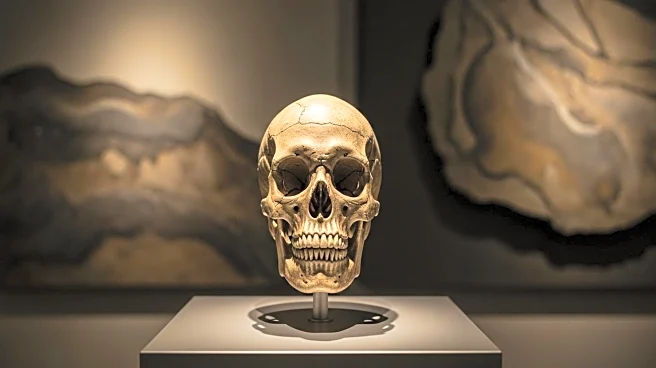What is the story about?
What's Happening?
A recent study of a million-year-old skull, known as Yunxian 2, suggests that the origins of modern humans may date back further than previously believed. The skull, discovered in China, was initially classified as Homo erectus but has been reanalyzed using advanced digital reconstruction techniques. Scientists now propose that it may belong to Homo longi, a group closely related to Denisovans. This finding could push the divergence between Homo sapiens, Neanderthals, and Denisovans back by at least 400,000 years, challenging the traditional view that modern humans originated in Africa.
Why It's Important?
The study has significant implications for understanding human evolution, potentially altering the timeline and geographic origins of Homo sapiens. If confirmed, this research could reshape theories about the migration and development of early human species, suggesting a more complex evolutionary history. The findings may also impact the study of genetics and anthropology, prompting further investigation into the relationships between ancient human groups. This research highlights the importance of technological advancements in paleontology, allowing for more accurate interpretations of fossil evidence.
What's Next?
The conclusions drawn from this study are likely to be contentious, as they contradict some recent genetic analyses. Further research, including additional fossil discoveries and genetic evidence, will be necessary to confirm these findings. Scientists may explore molecular data from the specimen itself to validate or challenge the morphological hypothesis. The study opens new avenues for research into human evolution, encouraging collaboration between paleontologists, geneticists, and anthropologists to refine our understanding of early human history.
Beyond the Headlines
This study underscores the dynamic nature of scientific inquiry, where new technologies and methodologies can lead to paradigm shifts in established theories. It also highlights the interdisciplinary nature of evolutionary research, where fossil evidence, genetic data, and computational analysis converge to provide a more comprehensive picture of human origins. The potential revision of human evolutionary timelines may influence cultural and historical narratives, prompting a reevaluation of humanity's shared heritage.
















